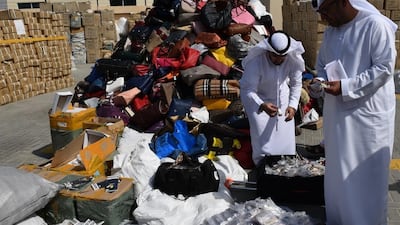For thousands of shoppers around the world, snapping up a cut price fake may seem like pretty harmless fun.
But with the sale of counterfeit products often funding criminal networks that cost millions to disrupt, the reality can be very different.
For years, cheap copies of genuine brands have flooded into the UAE for sale on street markets and in shops like those in Karama.
Today, however, that supply line is slowly being dismantled, with international law enforcement increasingly winning the fight against fakes.
“By attacking the distribution networks and disrupting production at the source, participating countries have contributed towards globally protecting people from potentially unsafe goods,” Tim Morris, Interpol’s executive director of police services, said.
“This is dismantling illegal networks which are often connected to other forms of serious crime.
“The sheer volume of seizures and follow-up investigations generated by these simultaneous global operations are testimony to the fundamental role of Interpol in shaping a coordinated response in regional and international operations. It’s all about collaboration.”
Between March and May in 2018, Interpol led anti-counterfeit operations across four continents.
It targeted criminal enterprise in 36 countries across Africa, Asia, the Middle East and South America in a concerted effort to splinter the global trade in rip-off goods.
Global seizures included 7.2 million counterfeit and illicit items weighing more than 120 tonnes, as well as 90,000 litres of liquids.
Beyond product seizures, national authorities also identified major trade routes and shut down points of sale as well as laboratories.
The private sector, too, has joined the attack.
In March, Al-Futtaim Toyota, in partnership with the UAE Government, conducted eight raids on counterfeit car part dealers across a number of emirates.
The net gain was the confiscation of 178,781 fake car parts worth Dh4.2 million.
Elsewhere in the region, Interpol’s Operation Qanoon saw authorities in Saudi Arabia detect, investigate and shut down 100 social media accounts used to distribute counterfeit medical products and unlicensed cosmetics and herbal remedies.
And at Jordan’s Aqaba seaport, authorities also seized a container from India containing 500,000 pills of antalgic pills bound for Iraq that could potentially have had fatal consequences had they flooded the black market.
______________
Read more:
Counterfeit goods worth hundreds of millions seized by Dubai Police
Advisory board set up to combat Dubai counterfeit traders
______________
The UAE has played an important role in the global collaboration to take on the counterfeiters.
In 2017, the Commercial Compliance & Consumer Protection (CCCP) sector in the Department of Economic Development (DED) seized 26.2 million pieces of counterfeit goods.
Although that figure was significantly lower compared to the previous year, its street value was higher due to the increased haul of luxury items.
Shoes topped the list of fake items seized, with 51,144 pairs worth approximately Dh400 million, or 37 per cent of the total.
Bags and other leather products came second with 337,212 pieces worth Dh72.1 million confiscated, while 2.2 million cigarettes worth Dh338.7 million were third.
In addition, 5.9 million pieces of fake cosmetics worth Dh61.3 million were found along with 3.6 million pieces of telephone accessories worth Dh50 million.
“The diversity and market value of the counterfeit goods seized in 2017 is a major achievement compared to 2016,” said Ibrahim Behzad, director of intellectual property rights management at DED.
“Counterfeit goods pose a threat to human health and the living environment.”


